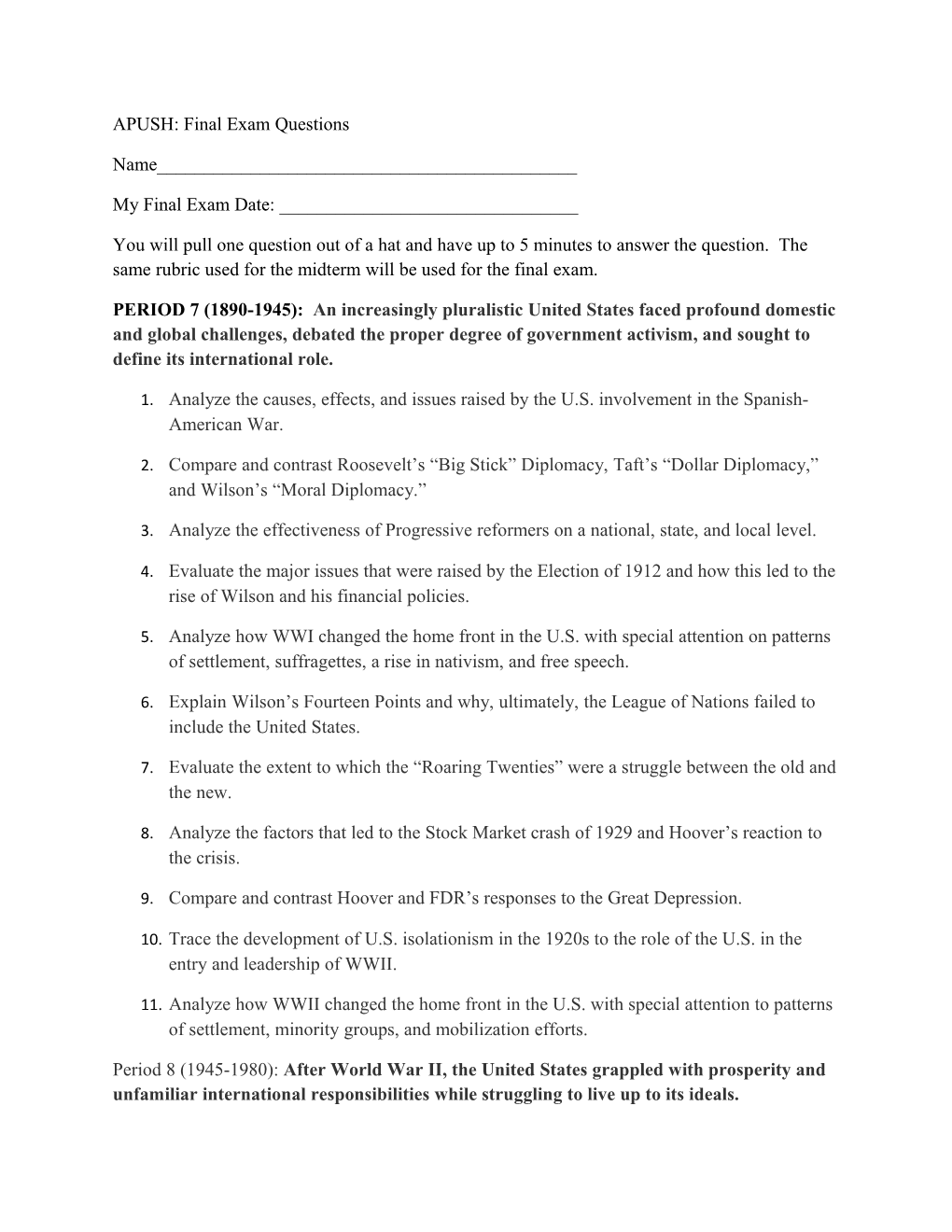APUSH: Final Exam Questions
Name______
My Final Exam Date: ______
You will pull one question out of a hat and have up to 5 minutes to answer the question. The same rubric used for the midterm will be used for the final exam.
PERIOD 7 (1890-1945): An increasingly pluralistic United States faced profound domestic and global challenges, debated the proper degree of government activism, and sought to define its international role.
- Analyze the causes, effects, and issues raised by the U.S. involvement in the Spanish-American War.
- Compare and contrast Roosevelt’s “Big Stick” Diplomacy, Taft’s “Dollar Diplomacy,” and Wilson’s “Moral Diplomacy.”
- Analyze the effectiveness of Progressive reformers on a national, state, and local level.
- Evaluate the major issues that were raised by the Election of 1912 and how this led to the rise of Wilson and his financial policies.
- Analyze how WWI changed the home front in the U.S. with special attention on patterns of settlement, suffragettes, a rise in nativism, and free speech.
- Explain Wilson’s Fourteen Points and why, ultimately, the League of Nations failed to include the United States.
- Evaluate the extent to which the “Roaring Twenties” were a struggle between the old and the new.
- Analyze the factors that led to the Stock Market crash of 1929 and Hoover’s reaction to the crisis.
- Compare and contrast Hoover and FDR’s responses to the Great Depression.
- Trace the development of U.S. isolationism in the 1920s to the role of the U.S. in the entry and leadership of WWII.
- Analyze how WWII changed the home front in the U.S. with special attention to patterns of settlement, minority groups, and mobilization efforts.
Period 8 (1945-1980): After World War II, the United States grappled with prosperity and unfamiliar international responsibilities while struggling to live up to its ideals.
- How did the United States go from being tentative allies with the U.S.S.R. to bitter enemies in the period 1945-1950?
- Evaluate the role Cold War fears played in American society from 1945-1963.
- Analyze the effectiveness of the Brown v. Board of Education case in 1954. Focus your answer on the period 1954-1964.
- How did the Civil Rights movement start about “eat(ing) at an integrated lunch counter” and evolve into “hav(ing) enough money to buy a hamburger?” (--MLK, March 1968) Focus your answer on the period 1964-1974. (hint: de facto vs. de jure segregation)
- Which President deserves the “blame” for the Vietnam War, and why? In your explanation, evaluate the role that the following Presidents played in Vietnam: Eisenhower, Kennedy, Johnson, Nixon, and Ford.
- Analyze the effectiveness of Johnson’s Great Society and the ability of President Nixon to deal with the effects of rising inflation. Focus on the period 1964-1974.
- Evaluate Richard Nixon’s Presidency. How effective was he as a president (foreign and domestically), and what were the short and long-term effects of his leadership upon the nation?
- Analyze the roots of the economic crises of the 1970s and the inability of various leaders to deal effectively with the crisis.
- In what ways were other groups inspired by the African-American civil rights movements of the 1960s? Analyze their impact upon the 1970s and beyond by focusing your efforts on: women, Hispanic-Americans, Native Americans, and movements to change de facto segregation.
Period 9 (1980-Present):As the United States transitioned to a new century filled with challenges and possibilities, it experienced renewed ideological and cultural debates, sought to redefine its foreign policy, and adapted to economic globalization and revolutionary changes in science and technology.
- Evaluate the effectiveness of the “Reagan Revolution” upon both foreign and domestic policy.
- What successes and failures did President George H.W. Bush face in his one term as President? (both foreign and domestic policy)
- Analyze the candidates, issues, and outcome of the Election of 1992. What were President Bill Clinton’s goals in his first term, and how well did he accomplish these goals?
- Evaluate the causes and effects of President Clinton’s impeachment.
- Analyze the candidates, issues, and outcome of the Election of 2000. What were President George W. Bush’s initial goals, and how were those changed on September 11, 2001?
- Evaluate the decision by President George W. Bush to order the invasions of Afghanistan and Iraq, including the causes and effects of both actions.
- What struggles, both foreign and domestic, did George W. Bush face in his first and second terms, and how did this affect the Election of 2008?
